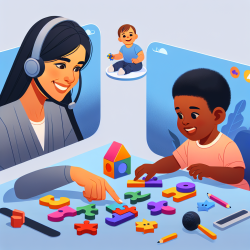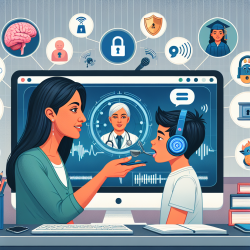The shortage of speech-language pathologists (SLPs) in K-12 schools and healthcare settings across the United States is a well-documented issue. This scarcity has driven up costs and placed a significant burden on institutions as they struggle to provide necessary speech therapy services. Telepractice, a cost-effective solution that allows practitioners to conduct live therapy sessions via real-time videoconferencing, has shown great promise in addressing this labor problem. However, one significant barrier remains: the lack of license portability for SLPs.
Research presented in the article "The Time Has Come for Speech-Language Pathology License Portability!" by Melissa Jakubowitz, M.A., CCC-SLP, highlights the critical need for a national initiative to create a model for licensure portability in the rehabilitation professions. This blog aims to explore how implementing the outcomes of this research can help practitioners improve their skills and encourage them to advocate for license portability.
Understanding the Problem
Despite the technological advancements that have removed geographic constraints, SLPs still face time-consuming and expensive licensing practices due to the lack of state license portability. Each state has its own licensing process, requiring SLPs to complete multiple applications, submit various documents, pay fees, and endure varying processing times. This duplicative process is particularly burdensome given the high degree of consistency in licensing requirements across states.
The Benefits of License Portability
Implementing license portability would offer several significant benefits:
- Increased Access to Services: SLPs could provide services across state lines, addressing personnel shortages and ensuring that students and clients receive the therapy they need.
- Reduced Costs and Administrative Burdens: Streamlining the licensing process would save time and money for both practitioners and institutions.
- Broadened Career Opportunities: SLPs would have the flexibility to work in multiple states, enhancing their career prospects and professional development.
- Improved Outcomes: Greater access to qualified SLPs would lead to better therapy outcomes for K-12 students and clients in diverse practice settings.
Advocating for Change
As a practitioner, you can play a crucial role in advocating for license portability. Here are some steps you can take:
- Stay Informed: Keep up-to-date with the latest research and developments in the field of telepractice and license portability.
- Join Professional Organizations: Engage with organizations such as the American Speech-Language-Hearing Association (ASHA) that are actively working towards licensure portability.
- Advocate for Policy Change: Reach out to state licensing boards and legislators to express your support for a national licensure portability model.
- Network with Peers: Connect with other SLPs to share experiences and strategies for navigating the current licensing landscape.
Implementing Telepractice
While advocating for license portability, it is also essential to effectively implement telepractice in your work. Here are some tips to help you get started:
- Invest in Quality Technology: Ensure that you have reliable videoconferencing equipment and a stable internet connection to conduct effective therapy sessions.
- Maintain Professional Standards: Adhere to the same ethical and professional standards as you would in face-to-face therapy.
- Engage Clients: Use interactive and engaging activities to keep clients motivated and involved during virtual sessions.
- Document Sessions: Keep detailed records of your telepractice sessions to monitor progress and ensure accountability.
Conclusion
License portability is a critical issue that needs to be addressed to fully realize the potential of telepractice in speech-language pathology. By advocating for policy changes and effectively implementing telepractice, practitioners can help alleviate the chronic shortage of SLPs and improve outcomes for children and clients in diverse settings.
To read the original research paper, please follow this link: The Time Has Come for Speech-Language Pathology License Portability!










